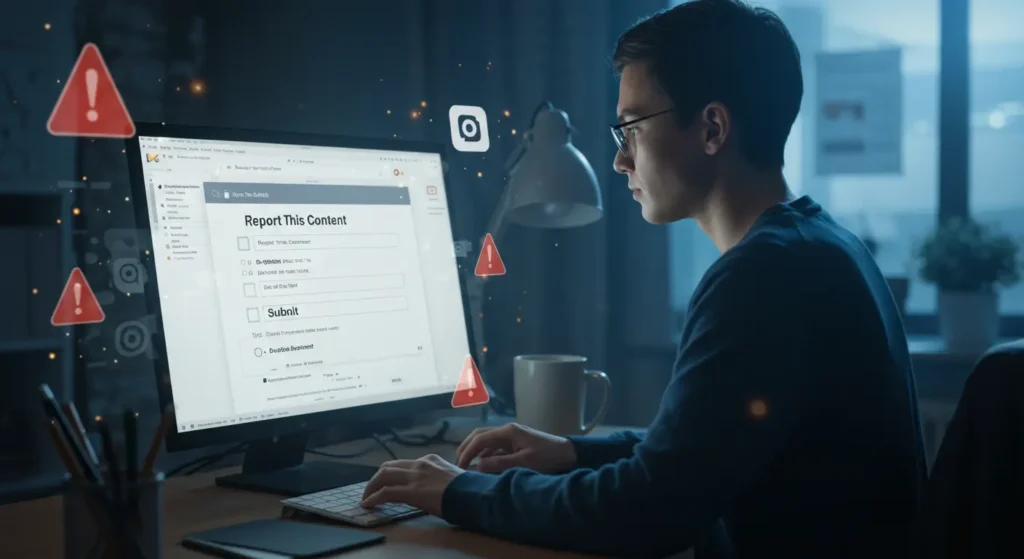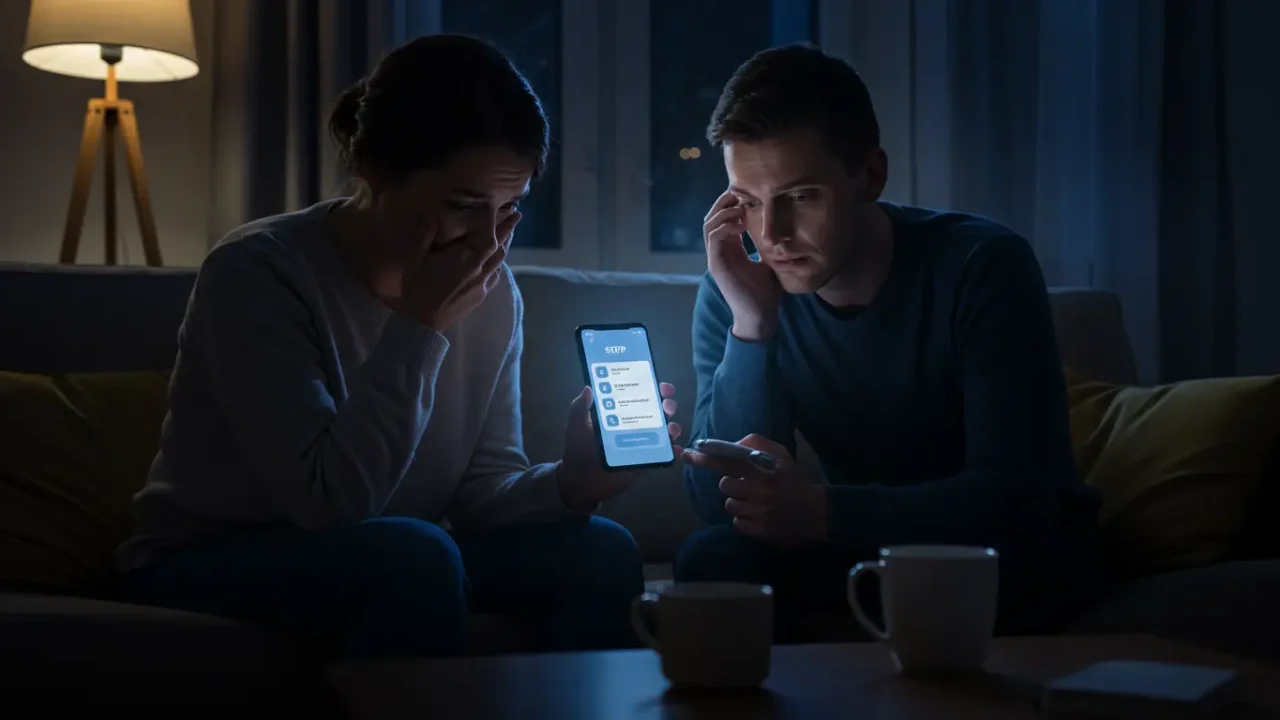What to Do if Someone Posts Your Nudes (Male Edition)
First, Take a Breath
Finding out that someone has posted your nudes online feels like a punch to the gut. Your heart is probably racing, your mind is spinning, and you might feel sick to your stomach. This reaction is completely normal. What happened to you is a serious violation of your privacy and trust.
You’re not alone in this situation. Thousands of men deal with having their private photos shared without permission every year. This doesn’t make what happened to you okay, but it means you’re not the first person to face this challenge, and there are clear steps you can take to handle it.
The most important thing right now is to know that this can be managed. Yes, it’s scary and upsetting, but there are concrete actions you can take to regain some control. You don’t have to figure this out all at once, and you don’t have to handle it alone.
If you are a female, and you are looking for what to do if someone posts your nudes, you can check our other blog here – Posts Your Nude if You are a Female.
Take a few deep breaths. This situation doesn’t define who you are as a person. What someone else chose to do with your private photos is about their character, not yours.
What to Do if Someone Posts Your Nudes if You are a Male
When you’re dealing with the shock of discovering your nudes posted online, having a clear action plan helps you move forward instead of feeling stuck. What to do if someone posts your nudes comes down to acting quickly while staying focused on the practical steps that will actually help your situation.

The person who shared your photos without permission broke your trust and likely broke the law. Your job now is to protect yourself and limit the damage as much as possible. This means documenting everything, reporting the content, and getting support from the right people.
Don’t Panic, But Act Quickly
Your first instinct might be to either ignore this completely or to do something drastic like confront the person immediately. Neither approach is likely to help you right now.
Ignoring the situation won’t make it go away, and acting impulsively when you’re emotional can make things worse. The person who posted your photos is hoping you’ll either stay quiet out of shame or react in a way that makes you look bad.
Instead, stay calm and focus on taking systematic action. The internet moves fast, but most platforms and legal processes take time to work. You have more control over this situation than it might feel like right now.
Remember that the shame belongs to the person who violated your privacy, not to you. There’s nothing shameful about having private photos or about someone betraying your trust. You’re the victim here, not the person who did something wrong.
Collect Screenshots and Evidence
Before you do anything else, you need to document what happened. This evidence will be crucial if you decide to report the content to platforms or pursue legal action.
Take screenshots of everything. Capture the post itself, including your photos and any text that goes with them. Screenshot the username of the person who posted them, the date and time stamps, and any comments or reactions. If the post is on social media, capture the number of views, likes, or shares if that information is visible.

Don’t just screenshot the main post. If people have shared it or reposted it elsewhere, document those instances too. If someone sent you a link or told you about the post, screenshot those conversations as well.
If you know how to check metadata on photos, that information can be useful too, but don’t worry if you’re not tech-savvy. The basic screenshots are the most important evidence you can gather right now.
Save all these screenshots in a folder on your device or computer. You’ll need them for reporting processes and potentially for legal action. Having this documentation organized from the beginning will save you stress later.
Report the Content
Every major platform has policies against posting nude photos without consent. The key is knowing how to navigate their reporting systems effectively.
For Instagram, go to the post and tap the three dots in the top right corner. Select “Report” and then choose “It’s inappropriate.” Instagram will walk you through additional options that include non-consensual intimate images.
On X (formerly Twitter), click the three dots on the post and select “Report post.” Choose “It includes private information” and then specify that it contains non-consensual nude or sexual content.
Reddit has a specific form for reporting non-consensual intimate images. You can find it in their help center under safety reporting. Include the direct link to the post and explain the situation clearly.
For other platforms like TikTok, Snapchat, or Discord, look for their community guidelines or help sections. Most have specific processes for this type of content violation.
When you’re filling out these reports, be direct and factual. Explain that intimate photos of you were posted without your consent. Don’t get into the emotional details or the backstory of your relationship with the person who posted them. Stick to the facts.
Contact the Website or Platform Directly
Sometimes the standard reporting process isn’t enough, especially if the content is on smaller websites or forums. In these cases, you may need to contact the platform’s support team directly.
Look for contact information in the website’s footer or help section. Many sites have specific email addresses for handling content violations or legal issues. Send a clear, professional email explaining that intimate images of you were posted without consent and requesting immediate removal.

Include links to the specific content and attach your evidence screenshots. Be polite but firm about the urgency of the situation.
You should also do a reverse image search to see if your photos have been posted on other sites. Use Google Images or TinEye to search using your photos as the query. If you find your images on multiple platforms, you’ll need to report them everywhere they appear.
Some websites are more responsive than others. Mainstream social media platforms usually act within 24-48 hours, while smaller or less reputable sites might take longer or ignore your request entirely.
Get Legal Support if You Can
Most states now have laws that make sharing someone’s intimate images without consent illegal. These laws are sometimes called “revenge porn” laws, though they apply whether the sharing was motivated by revenge or not.
The specific protections and penalties vary depending on where you live, but you likely have legal rights that were violated when someone posted your nudes. In many places, this is considered a form of harassment, invasion of privacy, or even cyber stalking.
If the person who posted your photos lives in a different state or country, the legal situation becomes more complex, but you may still have options for legal action.
Consider contacting a lawyer who handles privacy violations, cyber crimes, or harassment cases. Many lawyers offer free consultations where they can explain your options. If you can’t afford a private attorney, look into legal aid organizations in your area.
Some victim advocacy groups also provide legal support specifically for people dealing with non-consensual sharing of intimate images. The Cyber Civil Rights Initiative has resources and can help connect you with appropriate legal help.
Document everything as you go through this process. Keep records of when you reported content, what responses you received, and any ongoing harassment or threats you experience.
Talk to Someone You Trust
Dealing with this situation alone makes it much harder than it needs to be. You need support from people who care about you, even though talking about it might feel embarrassing.
Choose someone you trust completely – a close friend, family member, therapist, or counselor. Explain what happened and how it’s affecting you. You don’t need to go into graphic details about the photos themselves, just that private images were shared without your permission.
The person you talk to might not know exactly what to say, and that’s okay. Sometimes just having someone listen and validate that what happened was wrong can provide enormous relief.
If you’re not ready to talk to someone you know personally, consider calling a support hotline. The RAINN National Sexual Assault Hotline (1-800-656-HOPE) has trained counselors who understand privacy violations and can provide confidential support.
You might also want to speak with a therapist, especially if this experience is affecting your sleep, work, relationships, or mental health. Many therapists now have experience helping people who’ve experienced cyber harassment and privacy violations.
Remember that good friends and family members will be concerned about your wellbeing, not judgmental about the situation. The people who truly care about you will want to help you through this.
Protect Your Future Privacy

While you’re working to address the current situation, it’s also worth thinking about how to protect yourself moving forward. This isn’t about blaming you for what happened – the person who shared your photos is responsible for their actions, regardless of how those photos originally got taken or shared.
However, there are steps you can take to reduce the risk of this happening again. Consider using apps with enhanced privacy features for storing sensitive photos. Many phones now have private folders or vault applications that require additional authentication to access.
Be more cautious about cloud storage. If your photos automatically sync to iCloud, Google Photos, or other cloud services, someone with access to your accounts could potentially access those images. Review your cloud storage settings and consider whether you want intimate photos stored there.
When it comes to sharing photos with partners, trust your instincts. If someone pressures you to send photos or makes you feel uncomfortable about your boundaries, that’s a red flag. Someone who truly respects you will understand if you’re not comfortable sharing intimate images.
Consider having direct conversations with romantic partners about photo sharing and privacy. Make it clear that any images you share are private and not to be shared with others or kept if the relationship ends.
Don’t Let This Define You
What happened to you was a violation, but it doesn’t change who you are as a person. The photos that were shared don’t represent the full picture of your life, your character, or your worth.
You might be worried about how this affects your reputation, your career, or your relationships. These concerns are understandable, but remember that most people understand the difference between someone who was victimized and someone who did something wrong.
Focus on the people and activities that matter to you. Don’t let the fear of judgment prevent you from living your life or pursuing your goals. The vast majority of people will forget about this situation much faster than you think they will.
If you’re feeling overwhelmed by shame or embarrassment, try to remember that having private photos isn’t shameful, and being betrayed by someone you trusted isn’t your fault. You deserve privacy, respect, and support as you deal with this situation.
If You’re Tempted to Retaliate, Read This
If you know who posted your photos, you might be feeling angry enough to want to get them back somehow. Maybe you’re thinking about posting their intimate photos, sharing their personal information, or finding some other way to make them face consequences.
These feelings are completely understandable, but acting on them will only create more problems for you. Posting someone else’s nudes, even in retaliation, is illegal in most places and could result in you facing the same criminal charges that the original person should face.
Beyond the legal issues, retaliation keeps you trapped in this situation longer. It escalates the conflict and gives the other person ammunition to use against you. It also makes you look less sympathetic if you do pursue legal action.
The best revenge is handling this situation maturely and letting the legal system work. Focus your energy on protecting yourself and moving forward rather than on getting back at someone who has already shown they make poor decisions.
If you’re struggling with anger or thoughts of retaliation, talk to a counselor or trusted friend. These feelings are normal, but acting on them will hurt your situation more than help it.
Moving Forward
Learning what to do if someone posts your nudes is unfortunately becoming more necessary as technology makes sharing photos easier. The most important things to remember are that this situation is manageable, you have legal and practical options available, and this experience doesn’t define who you are.
Document everything, report the content wherever you find it, consider getting legal support, and lean on people you trust for emotional support. Protect your privacy going forward, but don’t let fear prevent you from living your life.
What happened to you was wrong, but you have the strength and resources to handle it. Take things one step at a time, focus on the actions that will actually help your situation, and remember that this will get better.








0 Comment